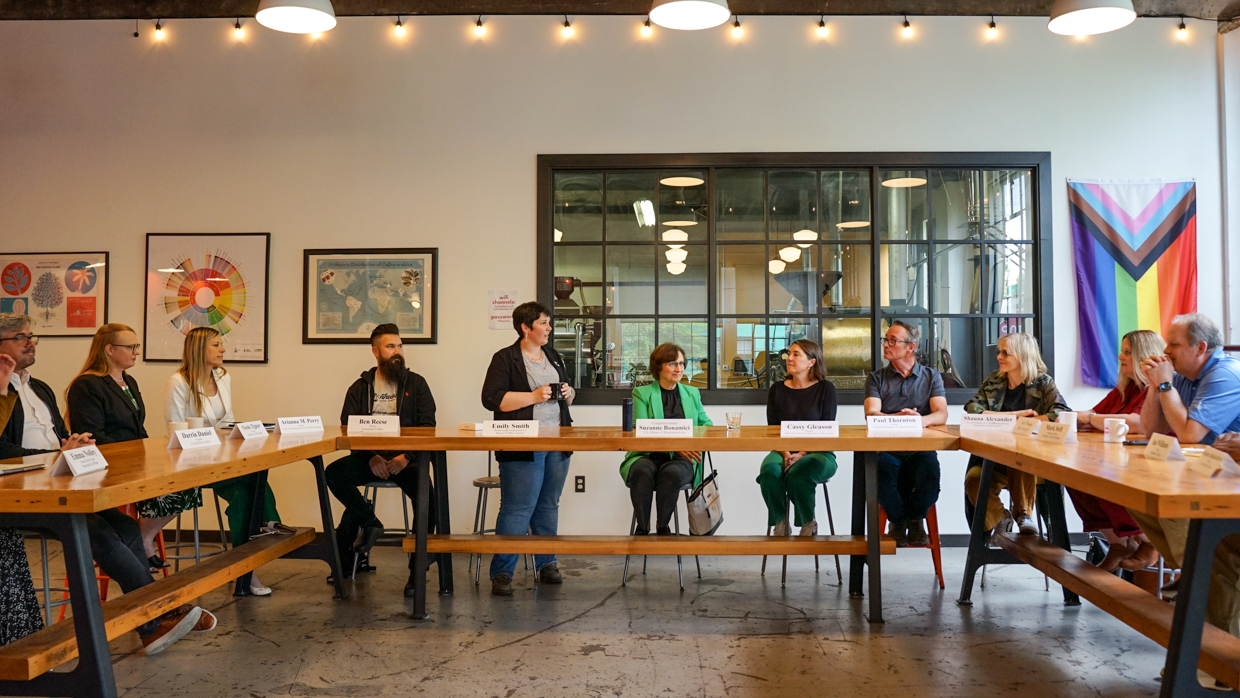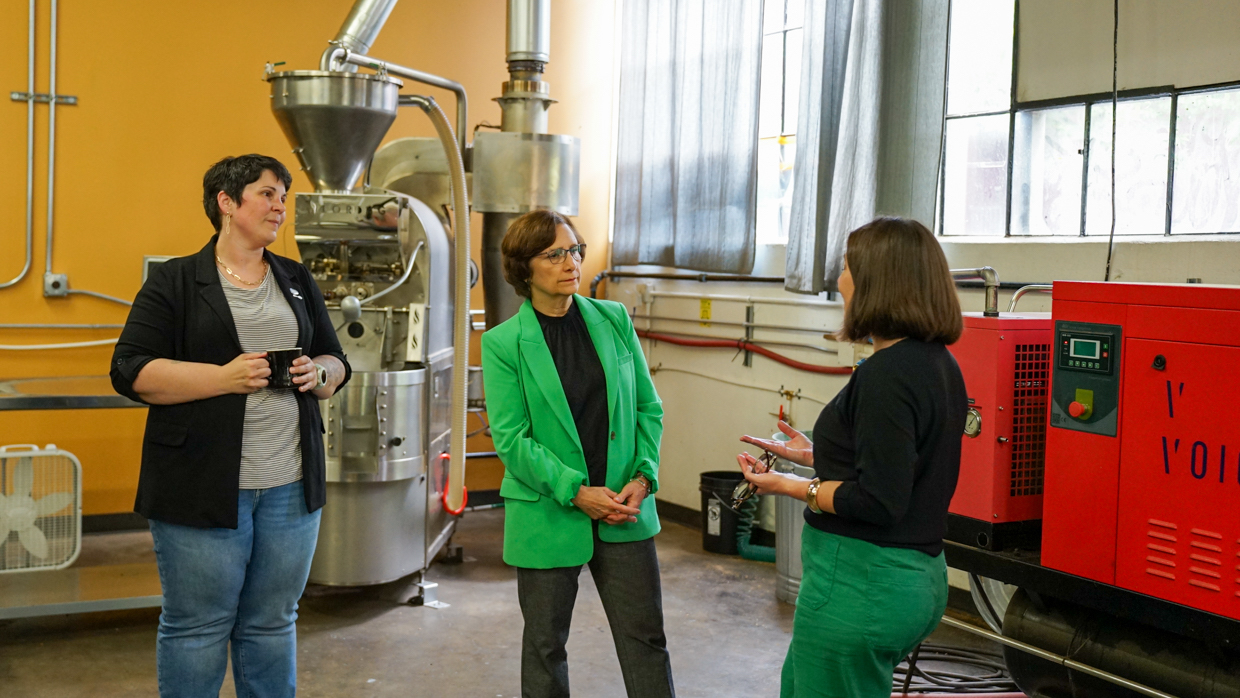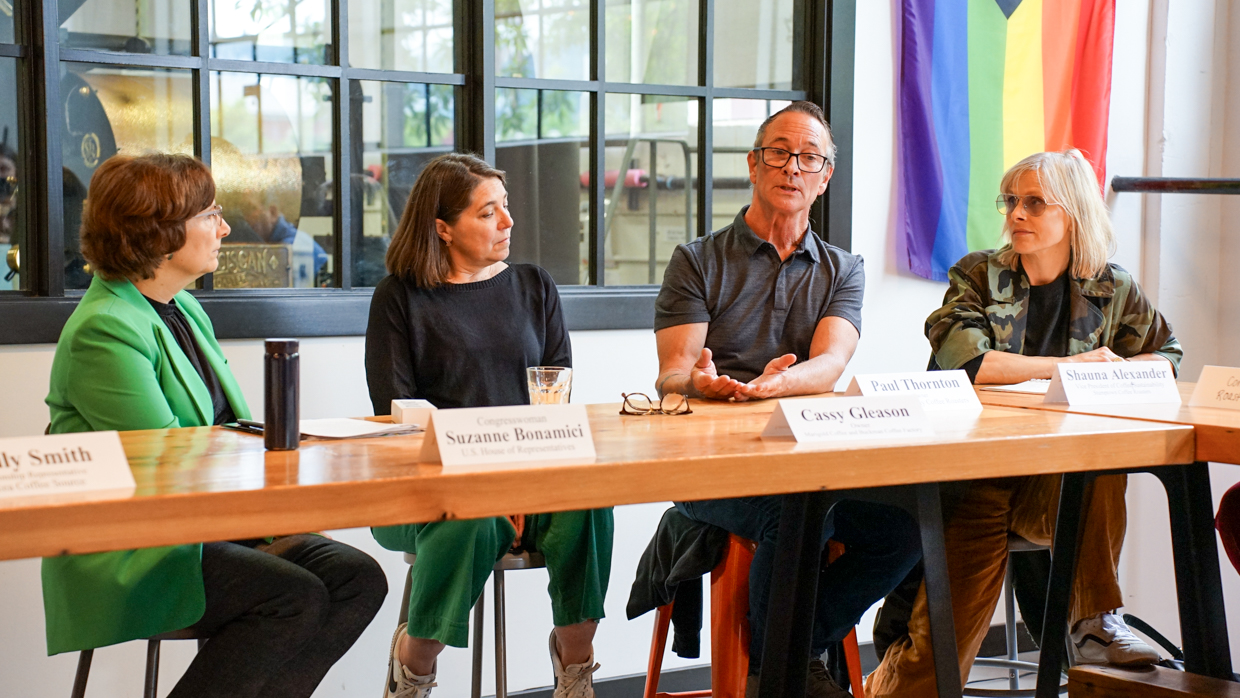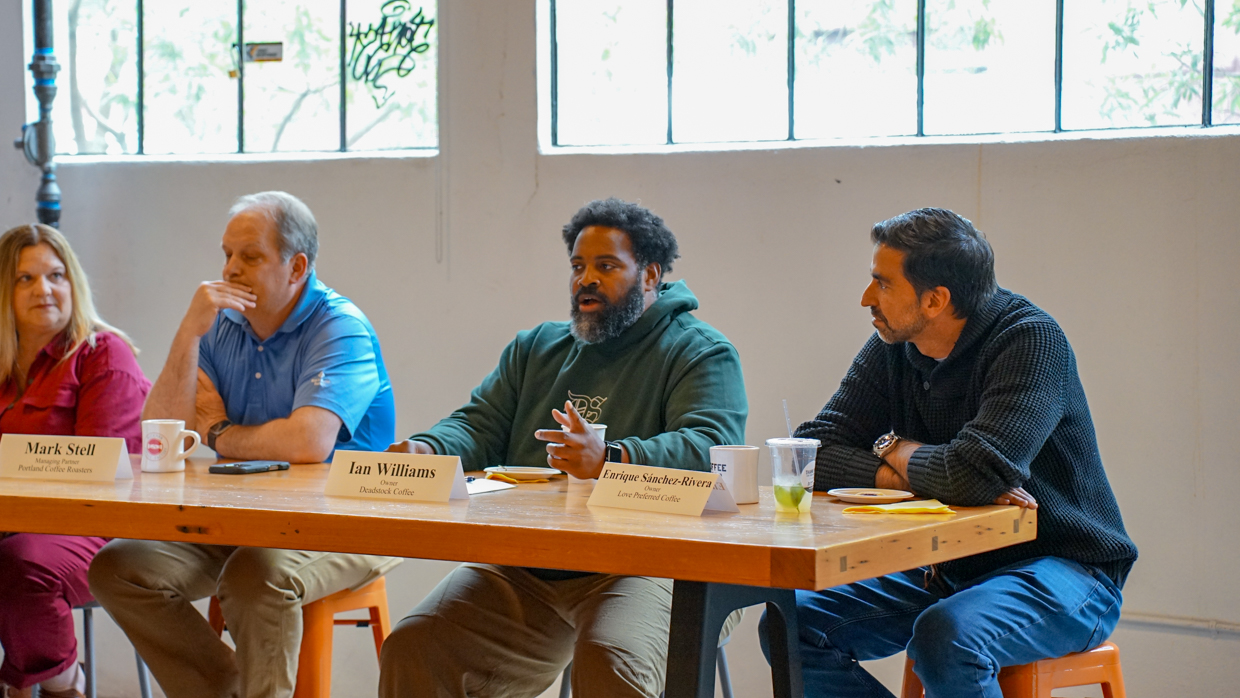
U.S. Rep. Suzanne Bonamici (center, green jacket) at a roundtable last week at Buckman Coffee Factory in Portland, Oregon. Daily Coffee News photo by Howard Bryman.
At a roundtable with U.S. Rep. Suzanne Bonamici last week in Portland, Oregon, coffee business leaders expressed frustration and a sense of urgency over tariffs, USAID cuts and other federal policies negatively affecting small coffee businesses.
Twelve business leaders from throughout Oregon — including importers, roasters and cafe owners — met with Bonamici inside the Buckman Coffee Factory co-roasting and education space, describing an industry grappling with new tariff costs, lost margins and mounting expenses associated with foreign goods.
Organized by Emily Smith, a Beaverton-based green coffee trader who works with Hacea Coffee Source, the event brought industry concerns directly to Bonamici, a Democrat who represents Oregon’s 1st Congressional district and is the newest member of the Congressional Coffee Caucus. The roundtable followed a tour of the Buckman facility led by Smith and Buckman Co-Owner Cassy Gleason.

Bonamici on a tour of the Buckman facility with co-owner Cassy Gleason (right) and Emily Smith of Hacea Coffee Source (left). Daily Coffee News photo by Howard Bryman.
Tariffs Threaten Small Business Survival
Reflecting an importers’ perspective, Smith conveyed the dilemma of Hacea needing to ensure its own survival in the face of untenable new tariffs while still supporting its small-business customers.
Smith said the company is facing more than $260,000 in new tariff costs so far this year, which are due prior to the release of the 581,191 pounds of coffee currently in contract for import. The company will have to seek financing in order to cover those costs, resulting in additional costs on top of the tariffs, Smith said.
“If we were to absorb a 10% tariff — assuming it stayed only at 10% — it would wipe out our margin, every single penny of it,” said Smith. “It would wipe out our business so quickly. But then we’re also nervous about if we have to pass it on. We care really deeply for small businesses who have also dedicated themselves to the betterment of our industry. We’re really worried about their ability to make it through those sorts of difficulties.”
Paul Thornton, a past Specialty Coffee Association of America president who has worked more than 40 years in the coffee industry and currently runs Thornton Family Coffee Roasters in Beaverton, spoke about the challenge of communicating with wholesale customers about short-notice, unplanned price increases, particularly as the current “C price” of coffee is historically high.

Paul Thornton of Thornton Family Coffee Roasters speaking. Daily Coffee News photo by Howard Bryman.
“We’re forward-selling businesses,” Thornton said. “The result to my business has caused consternation. I have to now have awkward conversations with customers who I sold coffee to… Roasters my size are giving up margins that are really costly to us.”
Smith spoke on behalf of the group, urging the congresswoman to push for an exemption for coffee under the new tariff orders, given the fact that domestic production from Hawaii and Puerto Rico could only cover a tiny fraction of domestic consumption.
Beyond coffee beans, cafe owners highlighted how tariffs on ancillary products are compounding financial challenges.
“Is there any conversation happening around the things that are adjacent to coffee — cups, coffee bags, all those things?” asked Ian Williams, owner of Portland’s Deadstock Coffee. “I know a lot of those do come from China… That’s also a huge hit for us as well.”
USAID Cuts Compounding Domestic Issues
Coffee leaders also expressed some frustration with the Trump administration’s shutting off USAID funding within the global coffee sector. Bonamici described the USAID cuts overall as “a colossal mistake” on the part of the administration.
Nicole Tignor, the owner of Portland-based wholesale supplier Specialty Coffee Supply, said cuts to USAID have reduced access to technical assistance programs, support for climate resilience measures and the availability of post-harvest tools for several of the small cooperatives her company works with. She said cuts to these programs may also be contributing to farm abandonment.
“With cuts from USAID, it can cause that desire for someone in a coffee-growing area to want to immigrate to the U.S., thus causing lots of problems in our industry,” said Tignor. “Also with tariffs, it takes away stability for those growers. When we’re in an administration that thinks about immigration constantly, it’s very short-sighted.”
Grassroots Campaigns Gaining Momentum
The prevailing sentiment in the room was that grassroots efforts on the part of coffee business leaders are needed in response to tariffs and other pressing issues, due to a lack of representation from political leaders or large trade organizations.
Smith’s initial outreach to congressional offices in April yielded only one response — from Bonamici’s office.
“Right now they’re getting a firehose of all these different emails covering so many different topics, but [Bonamici’s staff said] the email I sent stood out because it specifically mentioned small businesses within the local community and was asking for a meeting,” said Smith. “[The staffers] recommended that when you reach out to your congressional representatives or your senators, that you are being very specific, mentioning the effects that it’s having on your small business within their district or their community, and then also asking for a meeting where you can share your story about what’s going on.”
The approach is spreading beyond Oregon. Rachel Langer, owner of Red Rock Roasters in Albuquerque, New Mexico, followed Smith’s strategy, connecting with U.S. Sen. Ben Ray Luján’s (D) office, submitting a petition signed by a majority of the largest independent coffee companies in southern New Mexico.
“The coffee business in New Mexico is important because we don’t have that much industry,” said Langer. “We have laser guns and tourism. Restaurants and coffee shops are actually really important if you don’t work for the federal government.”
Sen. Luján’s office has requested detailed documentation of Red Rock’s current and upcoming tariff costs, signaling serious interest in the issue.
Said Langer, “They actually seemed really interested in the details, so I was happy to do it, because they asked.”
Industry Frustration with Congressional Democrats
The mood proved more confrontational in Portland, where local business leaders expressed dissatisfaction with perceived Democratic inaction on trade issues.
“I’m here to find out what you’re doing,” Mark Stell, managing partner at Portland Coffee Roasters, said. “It feels like we’re waiting for some other catastrophic event to happen before we see any action.”
Bonamici did outline constraints facing minority party members, while expressing optimism about eventual judicial intervention.
“We don’t have power right now in the House or Senate. We’re in the minority, we can’t bring forward legislation,” said Bonamici. “But we can certainly be active in the community.”
Smith emphasized the need for individual businesses to take direct action rather than relying solely on established trade organizations.
“I think it’s really important for small businesses to advocate for their own business. I think in the coffee industry we have really abdicated this responsibility to large organizations like SCA and NCA,” said Smith. “I don’t know how effective that is, but coffee businesses are in every single community, and I think we need a grassroots effort in order to make an impact in this and in these sorts of issues.”
Smith has already scheduled a follow-up call with U.S. Rep. Maxine Dexter (D), whose district includes Portland’s east side, as the grassroots campaign continues to expand.
Said Smith, “Every small business should be going out and writing letters and advocating for their small business and not waiting for a large organization to make headway.”
Comments? Questions? News to share? Contact DCN’s editors here. For all the latest coffee industry news, subscribe to the DCN newsletter.
Related Posts
Howard Bryman
Howard Bryman is the associate editor of Daily Coffee News by Roast Magazine. He is based in Portland, Oregon.







Comment